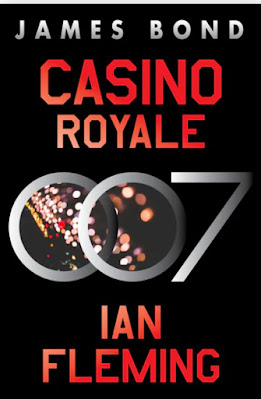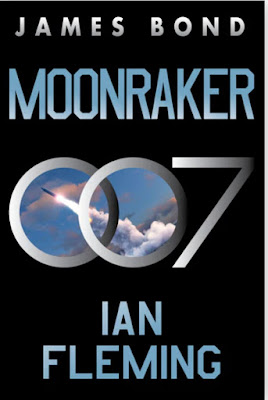JAMES BOND, Special Agent 007, is one of the most recognizable characters in both literature, as the subject of twelve novels, and as the face of one of the most successful movie franchises in history.
007 is so massive that the most recent actor to play the fictional covert agent, Daniel Craig, appeared alongside Queen Elizabeth during the opening ceremonies of the London Olympic Games in 2012.
Ian Fleming was the author of the James Bond series, and William Morrow will be re-launching the entire eighteen volumes of backlist fiction and nonfiction books he produced.
Morrow will publish three original, new James Bond thrillers set in contemporary times, and one of those will be reviewed here, Double or Nothing by Kim Sherwood, part of the Double O novel series. The next two will be published yearly, in early 2024 and 2025.
This review will also look at two of Ian Fleming's Bond novels, Casino Royale and Moonraker.
Double or Nothing: A Double O Novel
By Kim Sherwood
William Morrow; hardcoveer, 368 pages; $28.99
This is part of the trilogy that celebrates the original series by reflecting on Bond and familiar characters, such as Moneypenny and M, while introducing sexy, compelling, new Double O agent characters who are more diverse in race, gender, and sexuality than Bond's contemporaries.
Sherwood is the first woman to add new novels to the Bond franchise, as other authors such as Kingsley Amis and Anthony Horowitz added to the canon after Fleming passed away in 1964. Sherwood is a novelist and a Lecturer in Creative Writing at the University of Edinburgh. Her award-winning debut novel Testament was released in 2018, and the following year, Sherwood was shortlisted for the Sunday Times Young Writer of the Year Award.
Double or Nothing opens with James Bond having been captured, perhaps even killed, but a sinister private military company. His whereabouts are unknown, and it is up to the new generation of spies to save him.
The very best and brightest of MI6 are Johanna Harwood, 003; Joseph Dryden, 004; Sid Bashir, 009. They are supremely skilled, ruthless, and will do anything to protect the country.
In a nod to leading figures of this time, we are introduced to tech billionaire Sir Bertram Paradise, who claims he can reverse the climate crisis and save the planet. The question is if he can do what he claims, and it is up to the spies to uncover the truth because the future of humanity is in the balance.
Casino Royale
By Ian Fleming
William Morrow Paperbacks; paperback, 176 pages; $18.99
Casino Royale was Ian Fleming's first novel, and the book that launched the legendary adventure and espionage franchise starring James Bond/007, in which he plays a deadly game of chance.
"Le Chiffre" is a ruthless operative and the money-man for a Soviet cell in France, but he's on the verge of disaster after gambling away his client's money.
When he takes the last of his stash of cash to the casino, he lures a dozen wealthy players to a high-stakes game, as he hopes to hustle his way whole.
The British Secret Service would like to see this red thorn plucked from the hide of Europe, and sends their best card shark, James Bond, to the baccarat table to bankrupt Le Chiffre for good.
The cards are running against him and SMERSH operatives are threatening to kill him and his beautiful counterpart, Vesper Lynd, and 007 needs to turn his luck around before they lose their lives to the mission.
Fleming writes of Bond arriving at the casino in this excerpt: "The scent and smoke and sweat of a casino are nauseating at three in the morning. Then the soul-erosion produced by high gambling - a compost of greed and fear and nervous tension - becomes unbearable and the senses awake and revolt from it.
James Bond suddenly knew that he was tired. He always knew when his body or mind had had enough and he always acted on the knowledge. This helped him to avoid staleness and the sensual bluntness that breeds mistakes.
He shifted himself unobtrusively away from the roulette he had been playing and went to stand for a moment at the brass rail which surrounded breast-high the top table in the sale privee.
Le Chiffre was still playing and still, apparently, winning. There was an untidy pile of flecked hundred-mile plaques in front of him. In the shadow of his thick left arm there nestled a discreet stack of the big yellow ones worth half a million francs each.
Bond watched the curious, impressive profile for a time, and then he shrugged his shoulders to lighten his thoughts and move away.
The barrier surrounding the caisse comes as high as your chin and the caissier, who is generally nothing more than a minor bank clerk, sits on a stool and dips into his pile of notes and plaques. These are ranged on shelves. They are on a level, behind the protecting barrier, with your groin. The caissier has a cosh and a gun to protect him, and to heave over the barrier and steal some notes and then vault back and get out of the casino through the passages and doors would be impossible. And the cassiers generally work in pairs.
Bond reflected on the problem as he collected the sheaf of hundred thousand and then the sheaves of ten-thousand-franc notes. With another part of his mind, he had a vision of tomorrow's regular morning meeting of the casino committee.
'Monsieur le Chiffre made two million. He played his usual game. Miss Fairchild made a million in an hour and then left. She executed three bancos of Monsieur Le Chiffre within and hour and then left. She played with coolness. Monsieur le Vicomte de Villorin made one million two at roulette. He was playing the maximum in the first and last dozens. He was lucky. Then the Englishman, Mister Bond, increased his winnings to exactly three million over the two days. He was playing a progressive system on red at table five. Duclos, the chef de partie, has the details. It seems that he is persevering and plays in maximums. He has luck. His nerves seem good. On the soiree, the chemin-de-fer won x, the baccarat won y and the roulette won z. The boule which was again badly frequented still makes its expenses.'
'Merci, Monsieur Xavier.'
'Merci, Monsieur le President.'
Or something like that, thought Bond as he pushed his way through the swing doors of the salle privee and nodded to the bored man in evening clothes whose job it is to bar your entry and your exit with the electric foot-switch which can lock the doors at any hint of trouble.
And the casino committee would balance its books and break up to its homes or cafes for lunch.
As for robbing the caisse, in which Bond himself was not personally concerned, but only interested, he reflected that it would take ten good men, that they would certainly have to kill one or two employees, and that anyway you probably couldn't find ten non-squeal killers in France, or in any other country for the matter of that."
Moonraker
By Ian Fleming
William Morrow Paperbacks; paperback, 320 pages; $18.99
Sir Hugo Drax is a multi-millionaire tycoon and war hero who is revered by the British public for his Moonraker missile defense program.
It is thought-provoking why he risks destroying his reputation and the future of the Moonraker program by gambling millions of pounds at the card table, and is there something suspicious about his winning streak?
As Bond probes into the activities at the Moonraker base, he discovers that there is more to the mysterious Drax and his project than simply cheating at cards.
ABOUT IAN FLEMING: Ian Lancaster Fleming was born in London on May 28, 1908, and was educated at Eton College before he spent a formative period studying languages in Europe. His first job was with Reuters news agency, followed by a brief spell as a stockbroker. At the outbreak of World War II, he was appointed assistant to the Director of Naval Intelligence, Admiral Godfrey, where he played a key part in British and Allied espionage operations.
After the war, Fleming joined Kemsley Newspapers as Foreign Manager of the Sunday Times, and he ran a network of correspondents who were intimately involved in the Cold War. Casino Royale was his first novel, published in 1953, and it introduced James Bond, Special Agent 007, to the world.
The first print run sold out within a month, and Fleming published a new Bond title every year until his passing in 1964. Fleming's own travels, interests, and wartime experience gave authority to everything he wrote.
Raymond Chandler praised Fleming as "the most forceful and driving writer of thrillers in England." From Russia With Love" was the fifth title in the Bond series, and it was particularly well received and sales soared when President John F. Kennedy named it as one of his favorite books.
The Bond books were written in Jamaica, a country Fleming fell in love with during the war and where he built a house, "Goldeneye." He married Ann Rothermere in 1952, and the story he wrote for their only child, Caspar, in 1961, about a magical car, went on to become the well-loved novel and film, Chitty Chitty Bang Bang.
The novels in the James Bond series have sold more than 60 million copies and inspired a hugely successful film franchise, which began in 1962 with Dr. No, starring Sean Connery as Agent 007.
In the two books reviewed here, you will find a foreword from the Fleming Estate explaining the updates that were made to the text out of respect to contemporary concerns, and clarifying context in which Fleming was living and writing. James Bond is a product of his era, and as the subject of Cold War-era period, geopolitical thrillers, he has some sharp edges that are being polished in these updates to the text.



No comments:
Post a Comment